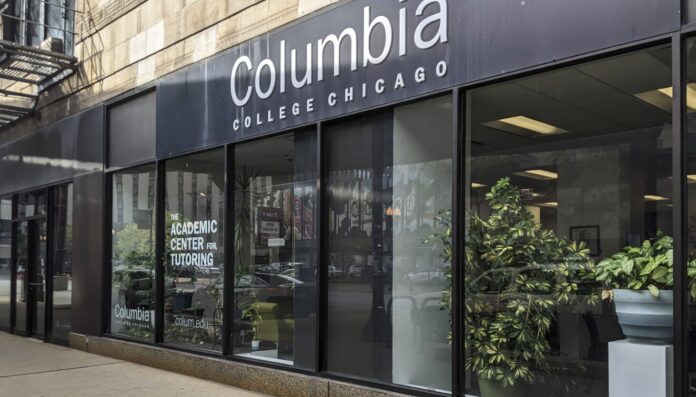Columbia College Chicago’s plan to eliminate 11 programs and lay off up to 25 full-time faculty members would mean the end of the only bachelor’s degree in American Sign Language interpretation offered in Illinois.
Deaf educators decried the decision, but the head of the South Loop school defended the cuts as necessary to Columbia’s survival.
“Financially, this is a decision that is supposed to help Columbia weather the years to come, but ethically and logistically, this decision will impact the Deaf community in a quite devastating manner,” K. Crom Saunders, an associate professor in the ASL department at the South Loop college, said over text.
Columbia College interim President Jerry Tarrer said in an interview the school will continue to offer courses and a minor in ASL, but will not offer training leading to the certification necessary to work as an ASL English interpreter in the state. He said he’s in talks with other institutions to see if they would be willing to continue the program.
“It’s extremely expensive to deliver,” Tarrer said. “We understand that this is something that is needed, but we just have to also, I think, balance that with [wanting] to be around for another 135 years, and we are having to make some really tough choices that we believe are in the best interest of the college.”
The changes were announced in an email from Tarrer to students on Monday and include reducing the number of undergraduate majors available next fall through cuts and consolidations from 59 to 33. But Tarrer told WBEZ the school will also start a new online beauty management program marketed to beauty and wellness professionals and companies.
“It’s kind of like an MBA program where the school will work with the company, and the company will sponsor a cohort of students through the program,” Tarrer said. “So that makes it affordable for the institution, because we know that … once we have a critical mass of students participating, they’ll be sponsored by their corporate sponsor.”
Tarrer said the changes will result in an estimated $5 million in cost savings over the next two years, while actually making the school more attractive to students.

A Missing poster depicting then-President of Columbia College Chicago Dr. Kwang-Wu Kim is taped on a pole as faculty and students carry signs during a strike by Part-time adjunct faculty members at Columbia College in 2023. Many students and faculty members called for Kim to step down last year, which he did at the end of the academic year after more than a decade in the role.
Anthony Vazquez/Sun-Times
Columbia spokesperson Lambrini Lukidis said the college has accumulated a $19 million deficit, down from $34 million last year. That follows years of enrollment declines and expensive infrastructure projects, including the construction of a $50 million student center in 2019.
In the fall of 2010, the school enrolled 11,400 undergraduates, according to federal data. By the fall of 2022, that number had fallen to 6,424.
Officials have said programs like the bachelor’s degree in ASL interpretation are underenrolled and cost the school more money than they bring in, but faculty and students say that program in particular is invaluable.
“The Deaf community is already under-served as it is,” said Saunders, adding that there is always more demand for ASL interpreter services than there are qualified interpreters. “We are looking at a potential future of more Americans with Disabilities Act (ADA) violations in terms of not providing accommodations, and there are plenty already.”
Small colleges across the country are facing enrollment and financial challenges, but Columbia College has been especially troubled in recent years. Last year, a strike by adjunct faculty, who make up a majority of educators at the arts-focused school, disrupted classes for six weeks.
Many students and faculty members called for then-President Kwang-Wu Kim to step down, which he did at the end of the academic year after more than a decade in the role. Tarrer, who served as the college’s chief financial officer, is serving as interim president.
“When you look across this country and look at other institutions that serve creative students … you see that they tend to have a more streamlined program mix, one that incorporates and builds upon the synergy across these various disciplines. Because there’s an understanding from employers that students are coming with not just one particular skill set, but the combination of skills,” Tarrer said. “It’s a big part of the rationale for streamlining and combining programs.”
Tarrer said students enrolled in programs slated for elimination will be allowed to finish out their programs or transfer to related ones. According to his message on Monday, faculty impacted by layoffs will be notified in January.
Lisa Kurian Philip covers higher education for WBEZ, in partnership with Open Campus. Follow her on Twitter @LAPhilip.
